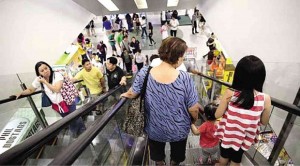Homecoming blues spark hot debate

IN MANILA, an escalator—as long as it’s moving—is meant to be stood on. People don’t clear the right-hand side to give way to those in a hurry. Anyone trying to move past other people on a moving escalator is considered boorish. PHOTO BY RAUL DANCEL
A journalist’s homecoming ambivalence and lamentations about Filipino ways has sparked a heated debate online.
Returning to Manila after seven years working in Singapore, journalist Raul Dancel admitted he no longer felt comfortable at home. He missed the cleanliness, security and efficiency of the neighboring city state, he wrote in an article (reprinted above).
Some responses dismissed the author as “pretentious” and “conceited (ang yabang).” Others reminded him that Singapore had its own faults and their ways, including their ways of speaking, were not exactly role models. But many others defended his candidness, saying it was about time Filipinos demanded something better and started shaping up themselves.
Reacted netizen Ambota: “He has only been to Singapore and he thinks he is somebody?”
“And after only seven years, he has forgotten our ways?” others chimed in.
Being Pinoy
Added netizen John: “Would the author insist on adopting all foreign customs in the Philippines? The bottom line is that if the author cannot accept he is Filipino, that the Philippines is where he grew up and lived except for seven years, then he should just get out.
Dancel was accused of having a “colonial mentality.”
Others attacked Singapore, saying it was known to be a very unfriendly and impolite country. Some noted a lot of racism and discrimination in that country, a lack of graciousness.
Quite a number of netizens insisted that in spite of criticism there was simply “no place like home.”
Defensiveness
Yet others said it was worth pondering why the observations and feelings of balikbayan Dancel provoked such offense and defense.
Wrote netizen Bokyo: “Are we saying we are happy with our situation in the Philippines where there are con-men all over the place? It’s a wake up call. If we keep ignoring negative comments, we will never change and move forward.”
Netizen AllinLawisFair agreed: “I’ve been living more than half of my life abroad and I understand what the writer was talking about. I have seen life in other countries and it makes me sad that after so many years have passed and so many presidents have served office, our country has not progressed like it should have, unlike many of its Asian neighbors which have overtaken us in the race. By just stopping over in the airports, one would already notice the difference. The airports of Bangkok, Kuala Lumpur, not to mention Singapore and Hong Kong are the windows of their countries to the outside world, as ours. Cleanliness of the surroundings is another factor. In Singapore one will be penalized if he is caught throwing chewing gums or cigarette butts on the ground. There are waste receptacles for them and people there are disciplined enough to used them.
An unorganized country
Seconded netizen Integridad Pilipinas: “I’m here for a short vacation and it’s been only a week and I can already feel the huge, and I must say sad, differences in living in an unorganized and underdeveloped country. Why is it that most Filipinos: 1) only follow the laws if they are in a different country? 2) pay bribes to government employees and police officers then complain of corruption? 3) make such harsh comments and judgements even though they have never set foot in a first world country? Why do you think they are called first world and developed nations in the first place? What made them that way? 4) just do as they please and say it’s a democratic country.”
Wrote netizen Tommy: “People are overreacting (to the article). Frankly, many of the ‘faults’ he [pointed] out, such as bad traffic manners and security guards all over the place, are true. I mean, are we all so sensitive that we can’t stand people pointing out flaws now?”
Pinoys deserve better
Netizen Paul Ng’s take: “This article only shows how different and still stagnant our country’s progress has been, but at the end of the day, the writer still admits that this is still the place he calls home. There’s nothing wrong with all his observations, simply because they’re true. He simply stated the facts based on how and what he has experienced here and in Singapore… it could have been better to contemplate on this and think about the stark comparison of two countries with different cultures and success.”
Ng suggested Filipinos could be getting to too used to poor service. “He probably knows that we deserve better. That we should actually do better to be at par or probably be better than the likes of Singapore. But as long as we still keep and actually defend these bad practices (by calling him pretentious or OA), the likes of the ones below will probably rule this nation one day and I really hope I’m dead by then. I love this country and I hope we stop trolling and start acting.” MSF
* * *
The full debate—flames, insults and all, can be accessed on Inquirer.net